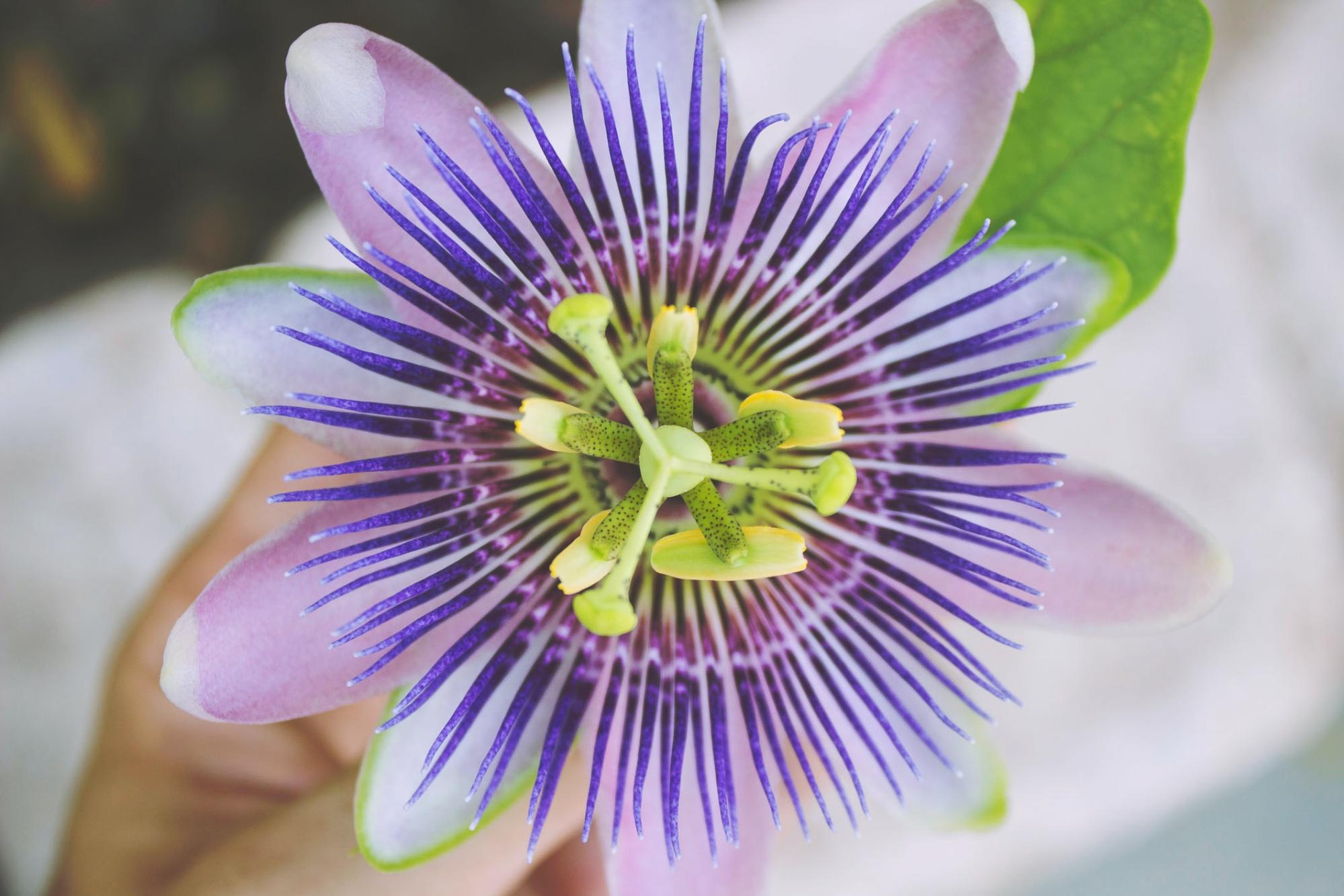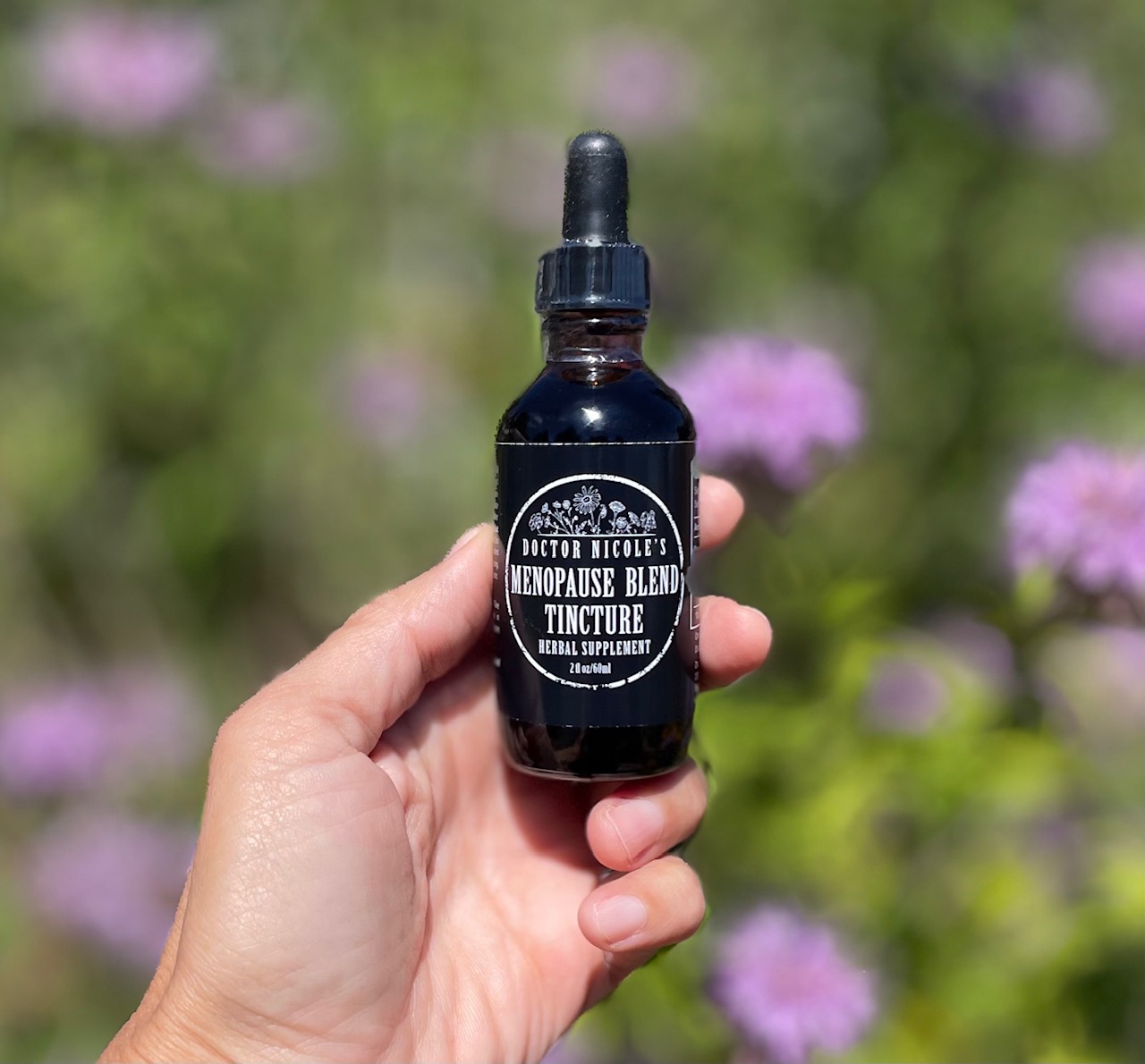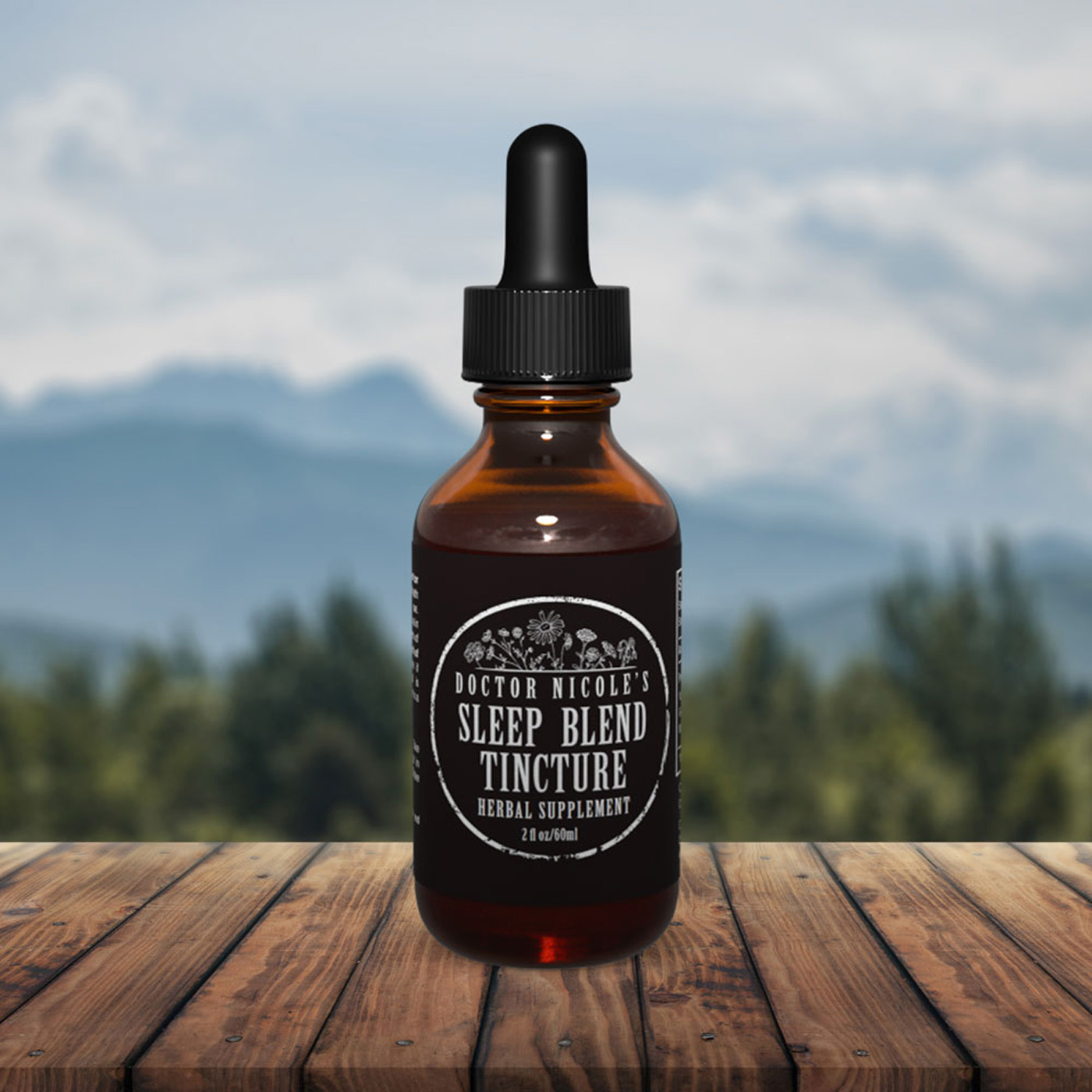Passionflower: Not Just Another Pretty Face
The striking passion flower vine is difficult to miss with its exotic blooms of purple, white, and gold, not to mention its delicious passion fruit. Beauty and good taste aside, this plant is a medicinal workhorse — from addressing insomnia, anxiety, and ADHD to balancing blood sugar levels and calming inflammation. For our purposes here I will focus on the benefits of the herb for the symptoms of menopause, including hot flashes, night sweats, sleep disruptions, depression, headaches, and anger. Let’s dive in!

The Beauty Behind Menopause Relief
Cultivated for thousands of years by the Aztecs and Incas and often grown in Europe and the southeastern United States, passionflower is a perennial climbing vine that has been long-used as a medicinal herb and food flavoring. More recently researchers have investigated the plant as an effective alternative to hormone replacement therapy (HRT) to address the symptoms of menopause.
A 2010 comparative study involving 59 menopausal women found that symptoms significantly decreased while taking passion flower extract, including vasomotor signs (hot flashes and night sweats), insomnia, depression, anger, and headache.1 Similar research in the same year noted that a notable decrease in hot flashes was experienced between the second and fourth week of taking the herb.5 In another study, the researchers established the anxiolytic (sedative) effects of the extract, along with the GABA-modulating ability in the brain.2 Because of this action, passion flower may help to alleviate the anxiety, depression, insomnia, and mood disorders often associated with menopause. Moreover, the botanical has also been shown to lower the production of monoamine oxidase in animal models, which may also help to address depression in menopausal women.3 A review published in Scientific World Journal notes:
“Different activities have been reported for P. incarnata, especially in the pharmaceutical field. These include its action on the central nervous system for the treatment of anxiety disorders and neuropsychic symptoms of menopause, such as pain, anxiety, sexual dysfunction, and sleep disorders.”4
Sleep disruption is also a significant issue for menopausal women. Passionflower — particularly when combined with valerian — can help alleviate sleepless nights by not only calming disruptive night sweats but by calming the nervous system overall and settling spinning thoughts.6 A case in point is a two-week clinical sleep study involving 84 participants with insomnia disorder. Those who were given 60mg of passionflower extract experienced improved sleep compared to the placebo group.7
Safety
While passionflower is generally well-tolerated by most, there are a few exceptions. The herb should not be taken with sedatives or alcohol as it may increase drowsiness. Since safety is unknown, do not use it if pregnant or breastfeeding. It is also important to discontinue use at least two weeks before a scheduled surgery as the herb can interfere with anesthesia. Consult with your healthcare practitioner before use if you have an underlying health condition or are taking prescription medication.
All-In-One Herbal Formulations
If you find yourself struggling to get enough deep, rejuvenating rest during menopause, our potent Sleep Blend can help! This convenient formulation contains concentrated extracts of passionflower, valerian root, hops strobile flower, and German chamomile to promote more restful and restorative sleep. Here are the benefits of each herb:
VALERIAN ROOT
- Enhances sleep by increasing the levels of the neurotransmitter gamma-aminobutyric acid (GABA)
- Helps decrease frequent waking at night and calms restless sleep
- Helps people fall asleep faster
- Promotes sleep quality and length
- Helps sleep issues connected with menopause
- Soothes stress and anxiety
HOPS
- Sedative properties to help with sleep
- Enhances the production of GABA, a calming brain chemical that promotes sleep
- Helps increase sleep time; works best in combination with valerian root, also in this blend
- Helps lower body temperature, which helps people enter into a relaxed state for sleep
CHAMOMILE
- Sedative
- Calms the nervous system
- Soothes muscle aches that may disrupt sound sleep
- Contains apigenin, an antioxidant that can help induce sleep
PASSION FLOWER
- Helps as an herbal sedative
- Anxiolytic (soothes anxiety) and helps calm the body and mind
- Enhances sleep quality
- Helps improve ADHD symptoms
- Helps reduce the effects of menopause — including depression and hot flashes
ESSENTIAL FOR RESTFUL SLEEP
“This tincture could be by your bedside, it tastes delicious. No need to wash it down. On normal nights I take one full dropper and feel sleepy within 30 minutes. On a bad night I might take two full droppers due to pain. Excellent.” -Penny L.
An outstanding complement to our sleep formulation, our Menopause Blend contains black cohosh and red clover — two traditional herbal remedies used to help ease symptoms and health concerns of menopause. Often used before bedtime to combat nighttime symptoms, it may be used for daytime support as well.
BLACK COHOSH ROOT
- Black cohosh is a phytoestrogenic plant known to help raise estrogen levels and suppress fluctuations resulting in hot flashes and night sweats. Studies show black cohosh to be an effective remedy to help soothe hot flashes.
RED CLOVER
- Red clover contains phytoestrogens and may help combat bone loss, as estrogen plays a prominent role in bone health. A recent study shows that red clover influences estradiol concentration, exercise performance, and gut microbiota.
- Due to its phytoestrogen isoflavonoid levels, red clover is a possible alternative or addition to hormone replacement therapy. It helps relieve many menopausal symptoms, including hot flashes and night sweats.
WORKED THE FIRST NIGHT!
“Absolutely love this product and it worked the first night I used it to keep night sweats minimal!”
-Christian W.
Take charge of your menopausal journey with these exceptional formulations. Designed to provide natural, effective support, our blends are here to help. Visit my apothecary today to learn how they can make a difference in your life!
Nicole Apelian
Nicole’s Apothecary Products in this Post
References
- Fahami F, Asali Z, Aslani A, Fathizadeh N. A comparative study on the effects of Hypericum Perforatum and passion flower on the menopausal symptoms of women referring to Isfahan city health care centers. Iran J Nurs Midwifery Res. 2010 Fall;15(4):202-7. PMID: 22049281; PMCID: PMC3203277.
- Elsas SM, Rossi DJ, Raber J, White G, Seeley CA, Gregory WL, Mohr C, Pfankuch T, Soumyanath A. Passiflora incarnata L. (Passionflower) extracts elicit GABA currents in hippocampal neurons in vitro, and show anxiogenic and anticonvulsant effects in vivo, varying with extraction method. Phytomedicine. 2010 Oct;17(12):940-9. doi: 10.1016/j.phymed.2010.03.002. Epub 2010 Apr 10. PMID: 20382514; PMCID: PMC2941540.
- Jafarpoor, Nima & Abbasi-Maleki, Dr. Saeid & Najafi, Ghader & Khodakarimi, Sina & Hajialiloo, Morteza & Nazloo, Morteza. (2014). ANTIDEPRESSANT-LIKE EFFECT OF ETHANOLIC EXTRACT OF PASSIFLORA INCARNATA IN ANIMAL MODELS OF DEPRESSION.
- da Fonseca LR, Rodrigues RA, Ramos AS, da Cruz JD, Ferreira JLP, Silva JRA, Amaral ACF. Herbal Medicinal Products from Passiflora for Anxiety: An Unexploited Potential. ScientificWorldJournal. 2020 Jul 20;2020:6598434. doi: 10.1155/2020/6598434. PMID: 32765195; PMCID: PMC7387951.
- Ghazanfarpour M, Sadeghi R, Abdolahian S, Latifnejad Roudsari R. The efficacy of Iranian herbal medicines in alleviating hot flashes: A systematic review. Int J Reprod Biomed. 2016 Mar;14(3):155-66. PMID: 27294213; PMCID: PMC4899762.
- Ngan, A., & Conduit, R. (2011). A double-blind, placebo-controlled investigation of the effects of Passiflora incarnata (passionflower) herbal tea on subjective sleep quality. Phytotherapy research : PTR, 25(8), 1153–1159. https://doi.org/10.1002/ptr.3400
- Lee J, Jung HY, Lee SI, et al. Effects of Passiflora incarnata Linnaeus on polysomnographic sleep parameters in subjects with insomnia disorder: a double-blind randomized placebo-controlled study. Int Clin Psychopharmacol. 2020;35(1):29-35. doi:10.1097/YIC.0000000000000291







